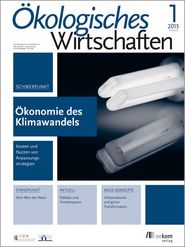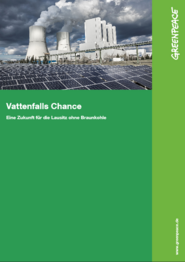Vattenfall's opportunity - A future for Lusatia without lignite.
The aim of this study is to demonstrate what a climate-friendly and socially responsible road map for transition for Vattenfall’s phaseout of lignite in Germany by 2030 could look like. To this end, the report first outlined a road map for the phaseout of lignite and compared its (regional) economic advantages and disadvantages. Then, to ensure a socially responsible phaseout, and in particular to provide for the loss of jobs, an alternative road map was drafted that showed how this loss of jobs could be compensated by the expansion of renewable energies, at least in terms of numbers.
Should a phaseout take place, about 4,100 jobs would be lost. The computed ecological follow-up costs are incurred by lignite mining and power generation. Even if measures are in place to internalized these costs (for example, follow-up costs are at least partially covered by provisions made by the companies responsible), a large part of the follow-up costs are externalized and must be paid for by society. The phaseout could significantly reduce external costs. In the event of such a phaseout, alone the environmental cost of emissions released when lignite is used to generate electricity, would be EUR 82.7 billion less than if lignite operations were to continue – that is, if a shift to renewable energies is carried out as recommended by the Alternative Road Map 2030.
There are different ways of responding to job losses resulting from the phaseout of lignite operations. In the present study, we examined to what extent the regional use of renewable energy sources to generate electricity could replace those jobs. Findings show that there is sufficient potential for a further expansion of renewable energies to compensate for job losses in the German states concerned. In fact, regional studies show that there is considerable potential for the expansion of renewable energies in the Lausitz region in particular. Even though other opportunities for investment in sustainable energy industries and the creation of jobs in areas such as renewable heat, the expansion of heat networks, energy efficiency, energy services and new technologies such as power to heat, power to gas, and power to X were not taken into account in this study.




